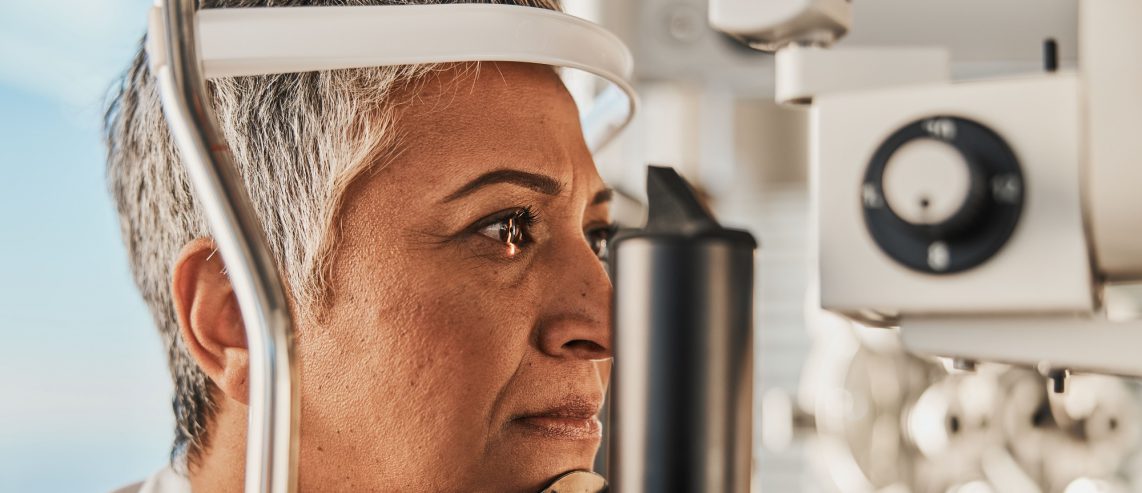As you get older, you may experience specific challenges with your vision. Adults around the ages of 40 to 60 are likely to start to notice changes in their eyesight. You might find it harder to focus your vision, and seeing or reading something up close might be challenging.
Never Miss a Beat!
Subscribe to Our HealthBeat Newsletter!
Thank you for subscribing!
You can now select the specific newsletters you'd like to receive.
You are already subscribed.
Subscribe to more newsletters in our email preference center.
Sorry, an error occurred. Please try again later.
Get Healthy Tips Sent to Your Phone!
Ways You Might Experience Vision Change
One of the most common vision-related problems you may experience as you get older is the difficulty with seeing things up close. This change where older adults, around ages 40 to 60, find it harder to focus their near vision is called presbyopia. Presbyopia is especially noticeable when reading small print and will likely progress as you age.
Older adults may also experience trouble distinguishing specific colors and struggling to adjust their eyes to different light levels.
It is essential to look out for any changes in your vision. In some instances, emergency intervention may be necessary. Some possible signs of an eye or vison-related emergency may include:
- Appearance of many new floaters in your vision. Floaters are tiny specks or “cobwebs” that appear to float across your vision.
- Experiencing double vision.
- Redness or swelling in your eyes or eyelids.
- Severe eye pain.
- Sudden and blurry vision or loss of vision.
If you notice these symptoms or any severe vision-related symptoms, contact an eye care professional right away.
Increased Risk for Eye Disease
As we age, we are also at an increased risk of developing various eye diseases. Some common age-related eye conditions and symptoms include:
- Age-related macular degeneration: Macular degeneration leads to damaged central vision, which is necessary for seeing things clearly. This can affect everyday tasks such as reading, driving, and more.
- Cataracts: Cataracts are a clouding of the lenses and the most common cause of vision loss.
- Diabetic retinopathy: Fluctuating changes in how clearly you see may stem from diabetes. Diabetes can damage the tiny blood vessels in the retina and could cause permanent vision loss.
- Dry eye. It is very common for the eyes to feel gritty and burn due to the eye dryness as we age.
- Eye floaters: Sudden onset floaters are an urgent indication for an eye exam as they may indicate a retinal tear or detachment. Long-standing eye floaters are generally a nuisance but not a problem.
- Glaucoma: Glaucoma, the second most common cause of blindness, may be associated with high pressure inside the eye that can lead to damage to the optic nerve.
Many medications can also have side effects that impact vision. People who take medications for specific health conditions may also experience vision-related side effects. Some of these conditions that are treated with medications that could affect your vision can include:
- Anxiety or depression
- Arthritis
- Thyroid
Treatment Options
There are many ways to help alleviate and treat the changes in your vision. An easy way to fix these issues is to wear glasses or contact lenses. Also, adjusting the lighting wherever you are can help improve your vision.
There are treatments available for specific conditions, such as macular degeneration and glaucoma, that can help treat them.
Some ways to help prevent and treat age-related vision disorders can be:
- Eye drops.
- Injections and laser treatments.
- Lowering cholesterol.
- New technologies like magnifiers and telescopic glasses.
- Quitting smoking.
Certain foods may reduce the risk of or slow the development of eye conditions:
- Berries such as blueberries, cranberries, strawberries, etc.
- Carotene-rich food, including carrots and sweet potatoes.
- Leafy greens such as kale and spinach.
- Vitamin C-rich foods like oranges, grapefruits, and broccoli.
Consult your eye doctor for yearly eye exams and any time you notice a change in your vision. For more information, visit the UPMC Vision Institute online or call 412-647-2200 to schedule an appointment.
About UPMC Vision Institute
The UPMC Vision Institute is a national leader in the treatment of eye diseases and disorders. We seek to improve and restore your vision to help your quality of life, diagnosing and treating a wide range of conditions in both children and adults. Our treatments include both surgical and nonsurgical options. We also offer routine eye screenings and have full-scale optical shops. Find an eye expert close to you.
